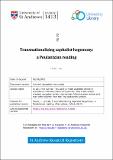Files in this item
Transnationalizing capitalist hegemony : a Poulantzian reading
Item metadata
| dc.contributor.author | Taylor, Ian | |
| dc.date.accessioned | 2018-08-13T09:30:06Z | |
| dc.date.available | 2018-08-13T09:30:06Z | |
| dc.date.issued | 2018-03-01 | |
| dc.identifier | 251328380 | |
| dc.identifier | 5967da68-b70d-4765-bfb1-694b173592c3 | |
| dc.identifier | 85033442911 | |
| dc.identifier | 000414676400002 | |
| dc.identifier.citation | Taylor , I 2018 , ' Transnationalizing capitalist hegemony : a Poulantzian reading ' , Alternatives , vol. 42 , no. 1 , pp. 26-40 . https://doi.org/10.1177/0304375417732849 | en |
| dc.identifier.issn | 0304-3754 | |
| dc.identifier.other | RIS: urn:4C1630A80C4ABBAA0075D7A08E364358 | |
| dc.identifier.uri | https://hdl.handle.net/10023/15808 | |
| dc.description.abstract | The international political economy is increasingly underpinned by transnationalizing social and class forces that exercise their interests utilizing nation-states and institutions. Whereas the previous "world economy" was typified by interactions between distinct national economies, in the current "global economy", service and production chains are ever more transnationalizing. In some readings, the notion of a "transnational state" has been advanced, with the state having broken out of its national limitations and become transnationalized. The transnational state thesis, however, is a concept too far. It denies the critical role played by the state in the internationalization process. Utilizing Poulantzas' notion of an interior bourgeoisie, an alternative framework is offered that gives us an insight into the ongoing transnationalizing processes that mark the current contemporary stage of capitalism. | |
| dc.format.extent | 778437 | |
| dc.language.iso | eng | |
| dc.relation.ispartof | Alternatives | en |
| dc.subject | Poulantzas | en |
| dc.subject | Globalization | en |
| dc.subject | Transnational classes | en |
| dc.subject | Hegemony | en |
| dc.subject | Interior bourgeoisie | en |
| dc.subject | JZ International relations | en |
| dc.subject | T-NDAS | en |
| dc.subject | BDC | en |
| dc.subject | R2C | en |
| dc.subject.lcc | JZ | en |
| dc.title | Transnationalizing capitalist hegemony : a Poulantzian reading | en |
| dc.type | Journal article | en |
| dc.contributor.institution | University of St Andrews. School of International Relations | en |
| dc.contributor.institution | University of St Andrews. St Andrews Sustainability Institute | en |
| dc.identifier.doi | 10.1177/0304375417732849 | |
| dc.description.status | Peer reviewed | en |
This item appears in the following Collection(s)
Items in the St Andrews Research Repository are protected by copyright, with all rights reserved, unless otherwise indicated.

